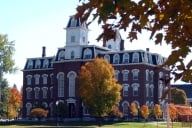You have /5 articles left.
Sign up for a free account or log in.
Administrators mostly honor faculty recommendations as to who gets tenure, at least when the faculty review boards are fairly united in their opinions. The president might have the official final say, but he or she generally trusts the judgment of previous faculty reviewers. And that’s the way it used to work at the University of Texas’ M.D. Anderson Cancer Center in Houston, where faculty members must reapply for tenure every seven years, professors say. (Many of course would argue that this is not tenure.) But a recent upsurge in tenure renewal denials of faculty-backed applicants has professors there questioning their new president’s commitment to shared governance.
“Faculty should rightly feel that their application for tenure renewal will receive a fair evaluation (involving a panel of their peers) and corresponding presidential actions,” reads a report on the matter recently accepted and endorsed by the M.D. Anderson Faculty Senate. “What this ultimately boils down to is shared governance as opposed to a semi-dictatorial system where the decision for tenure renewal can amount to an arbitrary process decided by one person.”
The report, called “Renewal of Tenure: The Presidential Veto” and obtained by Inside Higher Ed, continues: “The present situation must be considered the final morale buster – do your job and in the critical period of your life, after the most advantageous years of mobility, and [sic] find you are not wanted.”
M.D. Anderson’s Faculty Senate commissioned the report after five faculty members who reapplied for tenure with the unanimous support of the faculty Promotion and Tenure Committee were denied at the presidential level. Although the rate of tenure denial is still relatively low, at 2.3 percent, the report says that figure indicates a threefold increase in the rate of presidential vetoes since the arrival of the institution’s new president, Ronald DePinho, in 2011. In actual numbers, 2 applicants of 260 total going up for tenure between 2005 and 2011 were denied. From 2012-2013, 3 candidates of 130 total were denied.
To rule out that the faculty reviewers were “over-generous,” the Faculty Senate report subcommittee evaluated the academic accomplishments of the rejected applicants, comparing them with colleagues of the same rank and discipline whose tenure bids were approved during the same cycle. The report says that four of five rejected candidates’ funding levels, scores for scholarly impact and productivity, publication records, service, teaching and other honors and awards were similar to or, in some cases, better, than those of at least one colleague tenured during the same year.
The report says that none of the vetoed faculty members has been given a reason for the denial. All submitted requests for appeals and none were successful. The report attributes that to an internal, opaque appeals process that is “closely aligned” with the president’s office.
Zhengxin Wang, an associate professor of cancer biology who successfully first applied for tenure about seven years ago, thought that he was a shoo-in for renewal last year. He had strong service and research credentials; had secured a three-year, $380,000 grant from the Defense Department to study prostate cancer; and was the co-principal investigator on another funded project, he said. And he’d been endorsed, 11-0, by the Promotion and Tenure Committee.
So he was beyond surprised when he received a FedExed letter at his home saying his tenure renewal had been denied.
“That was a Friday, so the next Monday I sent an email to the provost, asking what’s the reason to decline my tenure,” Wang said.
Almost a year later, Wang is still waiting for an answer. He said his request for an appeal was handled by the provost’s office and resulted in a letter saying that his case had been “carefully considered” and that the president’s decision had been upheld.
“Nobody has ever discussed my case with me in person,” he said, noting that some internal departmental personality conflicts may have played a role in his denial. Wang is supposed to find a new job by August, but he said that’s proving tricky. Funding is tight, and although the general economy has recovered somewhat from the recession, scientific funding has been slow to follow.
Kapil Mehta, a professor of experimental therapeutics, had been working at M.D. Anderson for 30 years when his tenure renewal bid was denied in May 2012. He said he still has no idea why, and that the senior vice president for academic affairs, Oliver Bogler, told him he had no part in the process.
Mehta was granted an appeals hearing before a faculty panel, which sided with the Promotion and Tenure Committee to grant him tenure, he said. Senior members of his department and division also wrote a letter to Ethan Dmitrovsky, provost, asking that he grant Mehta up to two more years to address any areas of concern to the president. In an email to the professor, Dmitrovsky said his case had been reviewed already through faculty channels and that the final decision "should not be changed."
“What happened to me was totally unfair – I didn’t think this happened in America,” Mehta said.
The report says, “Privately many faculty have pondered whether the requirements for tenure renewal have changed with higher standards implemented by the new president.”
But the administration has denied that. According to minutes from a Faculty Senate meeting earlier this year, Dmitrovsky assured the senate that standards for tenure and promotion had not changed.
In an emailed statement, Dmitrovsky said, “It's rare for our decisions to differ from faculty recommendations. However, this occasionally occurs. When this is the case, decisions can be to deny or to approve tenure. In other words, faculty can also benefit from decisions on rare instances when our findings do not align with the recommendation.”
He continued: “Our decisions take into account performance measures that can be tracked and counted. However, those are not the only factors considered. We also discuss non-statistical information, such as the opinions and observations from those who work closely with the faculty member.”
The provost said that the tenure review and approval process at M.D. Anderson is “similar to the system used at many other academic institutions.” Faculty recommend candidates to the provost and president, who have the ultimate say.
But Greg Scholtz, director of tenure, academic freedom and governance, for the American Association of University Professors, said M.D. Anderson differs from the norm and recommended practices, starting with its renewable tenure policy.
Scholtz called the idea of tenure – a lifetime appointment – that is renewable a “contradiction in terms.” Although it’s not unheard of, he said, it’s rare, and against AAUP policy for being contradictory and because the organization maintains that faculty members who have served seven consecutive years at an institution automatically are endowed with tenure-like protections of academic freedom and due process. That means a terminated faculty member should be afforded an appeals hearing before an elected faculty body, in which the burden of proof of adequate cause should rest with the administration, not the professor.
AAUP policy also states that full-time faculty members serving on term appointments who are denied reappointment should be afforded a written statement of the reasons for the decision, if requested.
Also according to AAUP governance policy, a president should concur with a faculty recommendation on matters of faculty status, such as reappointment, "except in rare instances and for compelling reasons which should be stated in detail."
The Faculty Senate report makes various references to M.D. Anderson's deviation from AAUP policy.
In an email, Ann Killary, professor of genetics and Faculty Senate chair, said: “One of the important roles of the Faculty Senate is to have an ongoing discussion with the administration on faculty related issues including tenure. We are actively working in this regard with the administration and the president has indicated his willingness to work with the senate.”
Douglas Boyd, professor of cancer biology and chair of the Senate subcommittee that drafted the tenure report, said via email that M.D. Anderson, a stand-alone institution within the University of Texas System, risked possible censure by the AAUP by not addressing some of the issues in the report, as well as litigation from affected faculty members and faculty morale, which is “already in the dumps.”
Last year, a survey of clinical faculty members at M.D. Anderson found that increased demands for productivity under DePinho, who also raised funding targets in 2012, were negatively affecting patient care and the institution’s clinical reputation, the Texas Tribune reported. A majority of respondents said they had at least considered other jobs.
“I have stumbled,” DePinho told the Tribune. “It comes from running really fast.”









